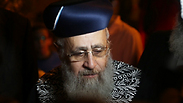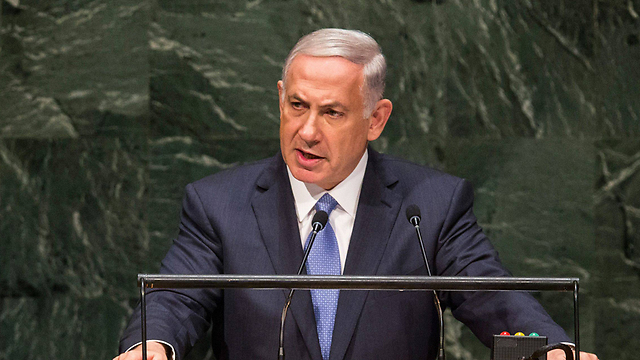
Chief rabbi lauds Netanyahu for thwarting conversion law
Rabbi Yitzhak Yosef congratulates prime minister for his 'brave decision' to drop his support for controversial law, which 'would have created a rift among the Jewish people.'
"Well done to the prime minister for standing tall," the rabbi wrote to Netanyahu, addressing him in the third person as a sign of respect. "I hereby bless his honor with a long life and many years of strong health."
Rabbi Yosef, who is affiliated with the Shas party, was one of the loudest opponents of Knesset Member Elazar Stern's conversion bill, which allows every city rabbi to establish a conversion court instead of the exclusive authority given to religious judges by the state.
'Helping unite the Jewish people'
Following the Chief Rabbinate's firm objection to the move, Netanyahu reached an understanding with the coalition factions that an acceptable version of the proposal would be approved as a government decision and not through legislation.
Several days ago, the prime minister decided to violate his commitment after the Rabbinate refused to accept the compromise, and the haredim are now repaying him.
The chief rabbi wrote in his letter, "I would like to congratulate Mr. Prime Minister for his brave decision to put off the submission of the conversion law, which would have created a rift among the Jewish people, thereby accepting our appeal to shelve this serious law."

Yosef mentioned the warning of "hundreds of rabbis, including Religious Zionism rabbis" that they would not recognize conversions performed by independent rabbis, which would lead to "horrible assimilation among the Jewish people, in Israel and in the Diaspora.
"In this decision, the honorable prime minister is in fact preventing this danger and helping unite the Jewish people," the chief rabbi concluded. "May his honor be blessed and continue to strengthen Judaism in the country and keep the Jewish spark alive."
Disputed law
About half a year ago, Rabbi Yosef called an emergency meeting in which he stated that the Chief Rabbi would not recognize conversions approved following the Stern law.
He said he accepted rabbis' ruling that "politicians will not determine the laws of conversion, but only Halacha, and the Chief Rabbinate has the final say."
Rabbi Yosef told Ynet after the meeting that "the law may lead to serious breaches which will not leave the Rabbinate a choice, and it will be forced to avoid recognizing conversions performed according to the discussed law."
The Rabbinate's pressure on the prime minister continued with a meeting between Ashkenazi Chief Rabbi David Lau and senior rabbis in Britain about a month ago, after which he warned that Diaspora rabbis would not recognize conversions performed in Israel if the state gave every city rabbi the authority to convert people to Judaism.
The law initiated by MK Stern seeks to expand the possibilities of conversion. According to proposal, 30 additional conversion panels will be appointed, each consisting of three religious judges. Currently, only 30 religious judges are authorized to convert people to Judaism.
In addition, each citizen will be able to choose where the conversion will be performed. Today, one can only convert in one's residential zone. According to the proposal, city rabbis' authorities will be expanded, allowing them to covert people. Currently, this procedure is only performed by the Chief Rabbinate's court.
The bill was approved by the Ministerial Committee for Legislative Affairs in November 2013, although representatives of the Bayit Yehudi party claimed the move contradicts coalition agreements. The proposal was then handed over to the Knesset's Constitution, Law and Justice Committee ahead of its second and third reading.
In the middle of the process, the coalition looked into the possibility of adopting the proposal as a government decision rather than through legislation, but on Tuesday the prime minister backed away from his support for the law.










